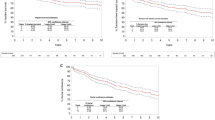Abstract
Implantation of an artificial sphincter is an alternative treatment for patients with severe faecal incontinence. This prospective study from one institution has evaluated the results from 13. Preoperative and postoperative incontinence scores, anal manometry, and quality of life were evaluated in 13 patients who had undergone implantation of an artificial sphincter over a 7-year period. Two patients were definitive failures. One developed acute total colitis after 5 years of satisfactory function, and a second had discomfort and demanded removal of an otherwise functioning device. After a median follow-up of 30 (range 5–76) months, 11 patients had an activated and functional device. These included 6 with a urinary AMS 800 and 5 with the newly designed anal ABS. The mean incontinence score decreased from 17 to 4, and quality of life improved markedly. Two of the 11 patients had undergone successful reimplantation, one following rupture of the cuff and the second following ulceration of the control pump through the labia. In no case was infection or erosion of the anal canal a cause of failure. While the cause of incontinence and age did not affect outcome, psychological reaction had a significant impact. The artificial anal sphincter may have a role to play in severe faecal incontinence.
Résumé
L'implantation d'un sphincter artificiel constitue une alternative thérapeutique chez des patients porteurs d'une incontinence fécale sévère. Cette étude prospective issue d'une institution évalue les résultats de 13 patients. L'incontinence pré- et postopératoire, les résultats de la manométrie et la qualité de vie ont étéévalués chez 13 patients qui ont subi l'implantation d'un sphincter articificiel au cours d'une période de 7 ans. Chez deux patients, l'intervention s'est soldée par un échec définitif. Un malade a développé une pancolite aiguë après cinq ans d'un résultat fonctionnel satisfaisant et un second s'est plaint d'un tel inconfort qu'il en est venu à demander l'ablation de la prothèse bien qu'elle fonctionne de manière satisfaisante. Avec un suivi médian de 30 mois (5–76), 11 patients sont porteurs d'une prothèse activée et fonctionnelle: il s'agit de 6 prothèses urinaires de type AMS 800 et de 5 porteurs de la nouvelle prothèse ABS. Le taux moyen du score d'incontinence a été abaissé de 17 à 4 et la qualité de vie remarquablement améliorée. Deux des 11 patients ont subi une réimplantation avec succès, l'un à la suite d'une rupture du manchon et le second en raison d'une ulcération de la pompe de contrôle dans la grande lèvre. En aucun cas, nous n'avons observé une infection ou une érosion dans le canal anal comme cause d'échec. Alors que la cause de l'incontinence et l'age n'affectent pas la qualité du résultat, les réactions psychologiques ont un impact important. Un sphincter artificiel peut donc avoir un rôle important à jouer dans le traitement de l'incontinence fécale sévère.
Similar content being viewed by others
Author information
Authors and Affiliations
Additional information
Accepted: 2 December 1997
Rights and permissions
About this article
Cite this article
Lehur, P., Glemain, P., Bruley des Varannes, S. et al. Outcome of patients with an implanted artificial anal sphincter for severe faecal incontinence A single institution report. Int J Colorect Dis 13, 88–92 (1998). https://doi.org/10.1007/s003840050141
Issue Date:
DOI: https://doi.org/10.1007/s003840050141




